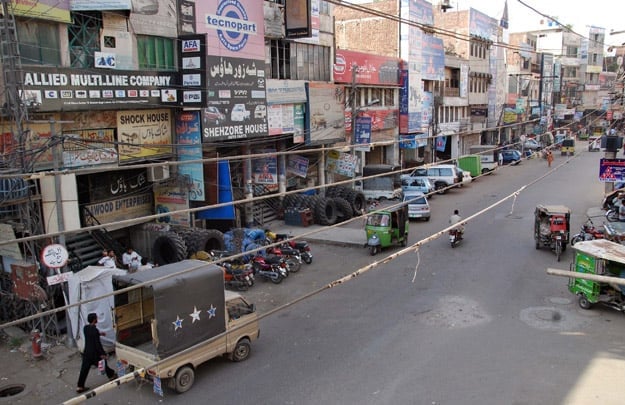Businesses Protest New Tax Measures; Shutdown Causes Over Rs50 Billion in Financial Losses
Nationwide Strike Cripples Trade Across Pakistan Amid Protests Against New Tax Reforms
KARACHI:
On Wednesday, private businesses across Pakistan came to a standstill as traders nationwide observed a strike in protest against new tax reforms introduced by the government. The new tax measures, aimed at expanding the tax base in the cash-strapped country, have ignited significant unrest within the business community.
The strike highlights a growing discontent with the government’s fiscal policies, as the expansion of the tax net poses a considerable challenge for the ruling Pakistan Muslim League-Nawaz (PML-N) and its coalition partner, the Pakistan Peoples Party (PPP). These parties, which have political affiliations with many of the protesting traders, are now facing backlash from their constituencies. The strike also saw support from opposition parties such as the Jamiat Ulema-e-Islam-Fazl (JUI-F), Jamaat-e-Islami, and the Awami National Party (ANP), further amplifying the protest.
In major cities including Karachi and Lahore, business shutters remained closed as the strike received overwhelming support from traders’ associations. Atiq Mir, Chairman of the All Karachi Tahir Ittehad, told The Express Tribune that the one-day shutdown led to an estimated financial loss of over Rs50 billion for wholesalers and retailers across the nation. Karachi, the economic hub and port city of Pakistan, alone experienced a setback of Rs4 billion.
Mir, with 50 years of business experience and 35 years as a trade leader, described the strike as the most successful he has ever witnessed. He noted that no market in the country operated on Wednesday, attributing the widespread support to the unbearable burden of soaring power bills and inflation that has united the business community. He emphasized that the strike was more than a mere protest; it was a movement against the economic hardships faced by traders and consumers alike.

Mir urged the government to reconsider its stance and address the public’s grievances, specifically calling for the withdrawal of the withholding tax (WHT) on food items to alleviate financial strain on ordinary citizens. Despite the substantial impact on the retail sector, industries continued to operate normally during the strike.
In response to the traders’ grievances, the government has taken steps to ease the situation. Recognizing the significant role of traders, the Federal Board of Revenue (FBR) has introduced a simplified bilingual income tax return form for traders. This form, effective for the tax year 2024 and onwards, excludes the requirement for detailed disclosures about assets and bank accounts, focusing instead on general questions. This move aims to address the concerns of traders while facilitating their compliance with tax regulations.
The government’s new tax scheme, which affects dealers, distributors, retailers, and other supply chain participants in 42 cities, includes a fixed monthly tax ranging from Rs100 to Rs60,000. Despite the lower tax rates for smaller shops, the scheme’s implementation remains challenging, with the FBR struggling to meet its tax targets.
The new tax measures are a part of the government’s broader effort to improve revenue collection. The tax scheme has been criticized for its limited scope, as traders have historically contributed less to the national income tax compared to salaried individuals. The government’s goal is to collect Rs50 billion in income tax this fiscal year, but the strike and resistance from the business community raise doubts about achieving this target.
In light of the protests, Prime Minister’s Coordinator Rana Ehsan Afzal appealed to traders to join the tax system and express their concerns to facilitate a conducive environment for compliance. He acknowledged the government’s challenges and emphasized the need for cooperation between the government and the business community to address economic issues effectively.
Afzal urged traders to register themselves under the tax net and promised government support and facilitation. He warned that non-compliance would result in consequences but reassured that the government prefers collaboration over confrontation. The appeal comes as the government faces significant revenue shortfalls and seeks to enhance resource allocation through increased tax compliance.
As Pakistan navigates its economic challenges, the collaboration between the government and the business community will be crucial in overcoming the current financial difficulties and ensuring sustainable economic development.

